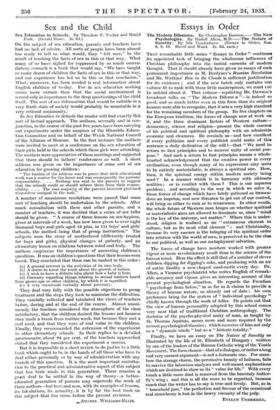Sex and the Child
Sex Education in Schools. By Theodore P. Tucker and Muriel Pout. (Gerald Howe. 3s. 8d.) ON the subject of sex education, parents and teachers have had no lack of advice. All sorts of people have been almost too ready to tell us what would, they " felt sure," be the result of teaching the facts of sex is this or that way. What many of us have sighed for (oppressed by so much contra- dictory counsel) is a book that would say, "We have taught so many dozen of children the facts of sex in this or that way, and our experience has led us to this or that conelugion." What, moreover, has been needed is real information about English children of to-day. For in sex education nothing seems more certain than that the social environment is second only in importance to the deep questionings of the child itself. The sort of sex information that would be suitable in a very frank state of society would probably be unsuitable In a very reticent community.
In Sex Education in Schools the reader will find exactly this sort of factual approach. The authors, severally and in con- junction, in the course of the past five years have been carrying out experiments under the auspices of the Rhondda Educa- tion Committee and on behalf of the Welsh National Council of the Alliance of Honour. In the first instance the mothers were invited to meet at a conference on the sex education of their girls, held in the schools which these girls were attending. The mothers were appreciative of these meetings and suggested that there should be fathers' conferences as well. A short address was given on the importance of some sort of sex education for growing children : " The burden of the address was to prove that such educational work was a matter for the home and was consequently the parents' responsibility. . . . Nothing was said to the parents to suggest that the schools could or should relieve them from their respon- Kibility. . . . The vest majority of the parents however professed themselves unequal to the task.', A number of unanimous resolutions were passed that some sort of teaching should be undertaken by the schools. After much consultation with these and other parents, and a number of teachers, it was decided that a series of sex talks should be given. " A course of three lessons on sex-hygiene, given at intervals of a week, has now been given to over eight thousand boys and girls aged is plus, in 111 boys' and girls' schools, the method being that of group instruction." The subjects were the story of motherhood (differently treated. for boys and girls), physical changes at puberty, and an elementary lesson on relations between mind and body. The authors emphasize the importance of answering children's questions. It was on children's questions that their lessons were based. They concluded that these can be ranked in this order :
(a) A general interest in the activities of its own body.
(b) A desire to know the troth about the growth of babies. (c) A wish to have a definite idea about how a baby is bon'.
(d) Curiosity regarding things relating to sexual matters heard from grown-ups or other children, by which it is mystified.
(e) A very occasional curiosity about paternity.
They deal very fully with the possible objections to group treatment and the steps they took to minimize the difficulties. They carefully collected and tabulated the views of teachers before, during and at the end of the course. Almost unani- mously the teachers considered the atmosphere of the class satisfactory, that the children desired the lessons. not because they made a break from routine work, but because they met a real need, and that they were of real value to the children. Finally, they recommended the extension of the experiment to other elementary schools. In their replies to a detailed. questionnaire, about 94 per cent. of the teachers approached stated that they considered the experiment a success.
But it is impossible in a short review to do justice to a little book which ought to be in the hands of all those who have to deal either personally or by way of administration with any breach of this question. It is the most important contribu- tion to the practical and administrative aspect of this subject that has been made in this generation. There remains a gcsat deal to be settled in the way of theory—a better- educated generation of parents may supersede the work of these authors—but here and now, with its examples of lessons, its talulations, its actuality, it is by far the best book on this subject that has come before the present reviewer.
AMA BEL WILLIAMS-ELLIS.






































 Previous page
Previous page